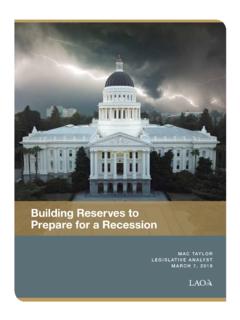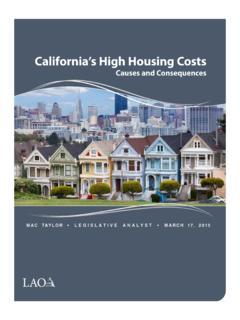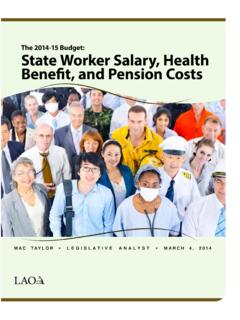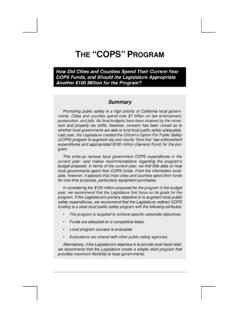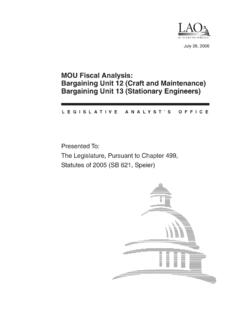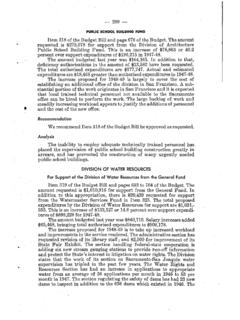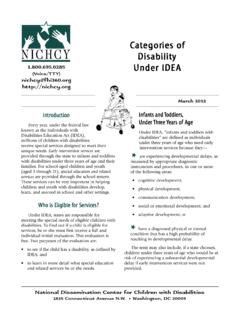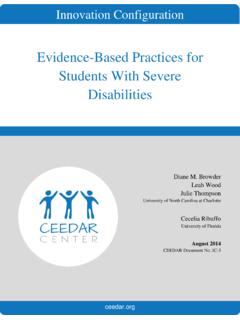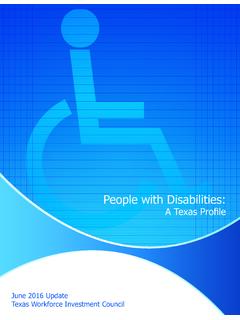Transcription of Improving Access to Dental Services for Individuals With ...
1 MAC TAYLORLEGISLATIVE ANALYSTSEPTEMBER 27, 2018 Improving Access to Dental Services for Individuals With Developmental DisabilitiesLEGISLATIVE ANALYST S OFFICEAN LAO REPORT gutteranalysis LAO REPORT1 Executive SummaryIndividuals with developmental disabilities face a number of behavioral, cognitive, and physical challenges that can adversely affect their health. Oral health is no exception. Individuals with developmental disabilities often need extra appointments or special accommodations that dentists may be unwilling or unable to provide. This report analyzes the extent to which Dental Services are available and sufficient for Individuals with developmental disabilities . Finding that Access challenges exist, we consider options and make recommendations for Improving Centers (RCs) Coordinate Services Including Dental Care for Individuals With Developmental disabilities .
2 State law directs the Department of Developmental Services (DDS) to provide Individuals with qualifying developmental disabilities (called consumers in statute) with Services to meet their needs in the least restrictive environment possible. Twenty-one independent nonprofit RCs coordinate Services for consumers in the community. Consumers Largely Pay for Dental Services With State-Funded Dental Insurance. RCs may only pay for Services directly if those Services are not covered and funded by another public or private source, such as the state s Medicaid program Medi-Cal or private insurance. Nearly eight in ten consumers are income-eligible for Dental insurance through the state s Medi-Cal Dental program, Denti-Cal.
3 Traditional Approach to Dental Care Not Designed With DDS Consumers in Mind. The vast majority of Denti-Cal providers work in private Dental offices that are not typically set up to serve DDS consumers, especially consumers with severe behavioral or physical limitations. Some Denti-Cal providers, such as Registered Dental Hygienists in Alternative Practice (RDHAPs), are trained to serve homebound and/or medically compromised patients and serve consumers more frequently, but there are relatively few of them statewide. While there are other potentially promising alternative approaches to Dental service delivery for consumers, such as Virtual Dental Homes (VDHs) or house-call dentistry, these are also relatively rare.
4 Many Consumers Lack Routine Dental Care. According to Denti-Cal data, only about 22 percent of consumers enrolled in Denti-Cal received even one Dental service in each of 2014, 2015, and Denti-Cal Provider Participation and Denti-Cal Payment Structure Limit Access for Consumers. Only 20 percent of the state s dentists participate in Denti-Cal. The relatively low number of Denti-Cal providers means longer waits for appointments, farther distances to travel, and/or the decision to forgo Dental care for consumers. Denti-Cal also limits benefits or sets low reimbursement rates that constrain Access to certain Dental Services commonly needed by consumers, such as periodontal treatment for gum disease.
5 In addition, under the current Denti-Cal payment structure, which pays dentists by the procedure, providers have an incentive to maximize the number of patients they see each day. This works against what is often the consumer requirement for additional appointments and time to receive Dental Services . Many consumers, for example, are unaccustomed to seeing the dentist and might require behavioral desensitization methods that help put a patient at ease before a Dental procedure. These methods often require additional time and fullLEGISLATIVE ANALYST S OFFICEAN LAO REPORT2 RCs and DDS Have Taken Steps to Address Consumers Dental Needs, Yet Access Remains a Problem. Over the past couple of decades, DDS and RCs have taken steps to address the Access problem.
6 Currently, 17 of 21 RCs employ a Dental coordinator whose responsibilities include expanding the network of Dental providers willing to serve DDS consumers, helping providers with Denti-Cal administration, conducting consumer case reviews, helping individual consumers find providers, training consumers and residential care providers on oral hygiene, and coordinating desensitization. The RCs without a Dental coordinator serve areas with some of the worst Access to Denti-Cal providers. DDS has also targeted state funding provided for community resource development to projects proposed by RCs to expand Access to Dental care, such as development of clinic-based Services that can accommodate DDS consumers.
7 While these actions have helped to improve consumer Access , consumer Access remains a significant problem, as evidenced by Denti-Cal make several recommendations, based on our three key assessments, to improve consumers Access to Dental care:Assessment Dental Coordination at RCs Effective, but Currently Insufficient in its Use Statewide: Require the administration to submit a plan to the Legislature to increase the number of Dental coordinators at RCs statewide. The administration should consider using DDS existing community resource development funds to fully or partially support the Denti-Cal Benefit and Rate Structure Limits DDS Consumers Access : Authorize behavior management benefit for DDS consumers eligible for Denti-Cal.
8 Improve Access to periodontal treatment for DDS consumers eligible for Denti-Cal: Modify or eliminate the current treatment authorization request requirement for scaling and root planing benefit for DDS consumers. Modify or eliminate the limit on periodontal maintenance for DDS consumers. Restore the prior Denti-Cal rate for periodontal Too Few Dental Providers Willing and Able to Serve Consumers: Consider authorizing a pilot program that would provide a supplemental payment to Denti-Cal providers who have undergone training to treat DDS consumers. Expand RDHAPs scope of practice. Consider requiring the administration to submit a plan targeting the use of DDS community resource development funds to develop additional Dental resources.
9 Potential components of the plan might include: Increasing Dental coordination at RCs, as noted above. Increasing service provision at clinics, such as federally qualified health centers. Increasing the number of VDHs. Consider providing incentives for dentists to practice house-call LAO REPORT3 INTRODUCTIONI ndividuals with developmental disabilities face a number of behavioral, cognitive, and physical challenges that can adversely affect their health. Oral health is no exception. Many Individuals with developmental disabilities cannot personally maintain their own Dental hygiene and suffer poor oral health outcomes, such as decaying teeth and gum disease, as a result. Under state law, Individuals with qualifying developmental disabilities can receive Dental Services paid for by the state, but often they need extra appointments or special accommodations that dentists are unable or unwilling to provide.
10 With the scheduled closure of the state s three remaining state-run institutions for Individuals with developmental disabilities known as Developmental Centers (DCs) and the accompanying transition of DC residents into the community, the Department of Developmental Services (DDS) is funding the development of new community resources to address the service needs of those formerly institutionalized. The staff of the Regional Centers (RCs) which oversee the provision of Services in the community have indicated that Dental Services are a pressing need among their consumers living in the community. Research has highlighted disproportionately high rates of Dental disease and tooth decay among Individuals with developmental disabilities and has noted that these Individuals are more likely than the general population to lack Access to regular Dental care across their lifespan.
